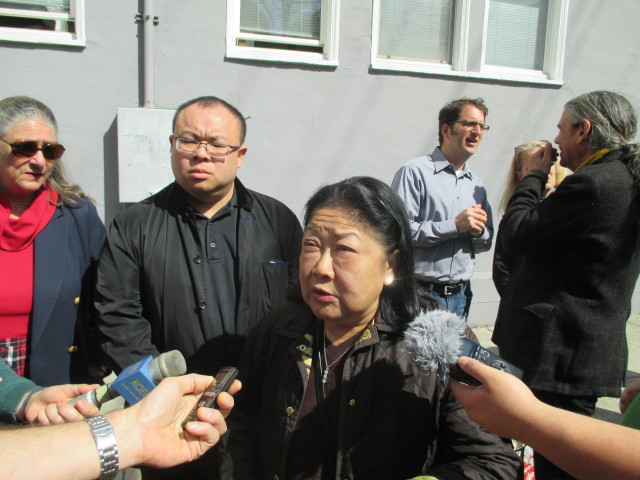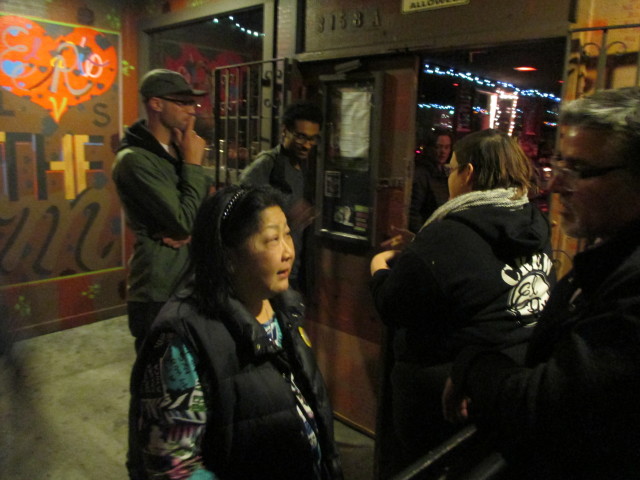
The most remarkable thing about the close vote to name the Central Subway’s Chinatown Station after Rose Pak was how little the opposition had to do with Rose Pak.
I watched almost all of the more than five hours of testimony. The supporters, including Sup. Sandra Lee Fewer, former Sup. Jane Kim, Re. Norman Fong, who runs the Chinatown Community Development Center, and others, talked about the role Pak played in making the train to Chinatown happen.

We heard that she started years ago, after the demolition of the Embarcadero Freeway, pushing for an underground transit route to Chinatown. We heard how much of an advocate she was for the community. We heard that she was often aggressive and pushy (although we don’t typically hear that sort of criticism about men) – but single-minded in her efforts to help her community.
And a lot of young people were speaking in favor: The outpouring of support from the next generation of activists, most of them on the progressive side, was clear and obvious.
I had my political disagreements with Pak. But I get that she was a major force pushing for the subway, and I understand why people want to honor her.
The interesting thing was that, other than a few speakers who suggested that Pak was “corrupt” (Quentin Kopp) and a “bully” (members of the Chinatown Merchants Association), most of the opposition had nothing to do with local transit policy.
It was about the Falun Gong and the People’s Republic of China.
The spiritual movement clearly spent a lot of money and time organizing people to say that Pak was too closely linked to the Chinese government, that she was, in the words of some, a “communist agent.” (Actually, from my experience, Pak was very much a Capitalist Agent; she worked with the Chinese Chamber of Commerce, and our disagreements were over her support for politicians like Ed Lee, who were far too willing to let the free market determine housing and development policy.)
Help us save local journalism!
Every tax-deductible donation helps us grow to cover the issues that mean the most to our community. Become a 48 Hills Hero and support the only daily progressive news source in the Bay Area.
I’m not here to defend the Chinese government. But I don’t think the Falun Gong movement represents progressive San Francisco ideas, either: the group’s newspaper, the Epoch Times, is firmly in the Trump camp, and was just banned from Facebook for posting pro-Trump ads without any clear disclosure where they were from.
The doorhanger I got and the posters I’ve seen around town opposing the station naming had no information identifying the source of the funding.
So at this point, it will be Chinatown Rose Pak Station. Unless someone tries to take this to the ballot, in which case we will get an actual clear picture of where the anti-Pak money comes from.
The Board of Supes is still on recess, but two major items come before the Planning Commission Thursday/29. The first is Sup. Ahsha Safai’s proposal to allow overnight camping and long-term vehicle parking in a city-owned lot at 2340 San Jose, near the Balboa Park BART station. The lot will be eventually be turned into affordable housing, but that project won’t break ground for at least another year, maybe two.
In the meantime, people who have been living in their vehicles for more than 60 days would have a place to stay, with bathroom and shower facilities on site.
The planning staff points out, correctly, that the homeless crisis won’t be over in 12-24 months, and that this would be only a short-term stopgap solution. But if it works as a pilot project, there are plenty of other sites in the city.
Then comes the draft environmental impact report on The Hub – the 84-acre area around Market and Van Ness. The idea is to add about 7,200 new housing units to The Hub, an area that’s already highly congested – and that nine major Muni lines and one streetcar line cross.
The Planning Department still insists that there are no significant traffic or transportation impacts to worry about. They got to that conclusion with some stunning numbers games.
The DEIR says that since this is already an area well-served by transit, developers can build housing without a lot of parking, discouraging car use. Which is a fine idea – except that the population likely to occupy these high-end apartments and condos are less likely to get on a Muni bus anywhere, and more likely to take Uber of Lyft. They’re also highly likely to order food from delivery services and goods from place like Amazon. So there will be a lot of new traffic whether they allow parking or not.
How much? Well, the Planning Department says, Uber and Lyft won’t tell us how many passengers they pick up and drop off, and where. So that means planners can’t study the problem.
However, the report notes:
The Hub Plan could result in commercial vehicle and passenger loading demand that could not be accommodated off-street or within curbside loading spaces, which could result in potentially hazardous conditions or significant delays for transit, people bicycling, or people walking.
And what do we do about that?
There is no feasible mitigation available to reduce this impact.
The hearing starts at 1pm in Room 400, City Hall.
